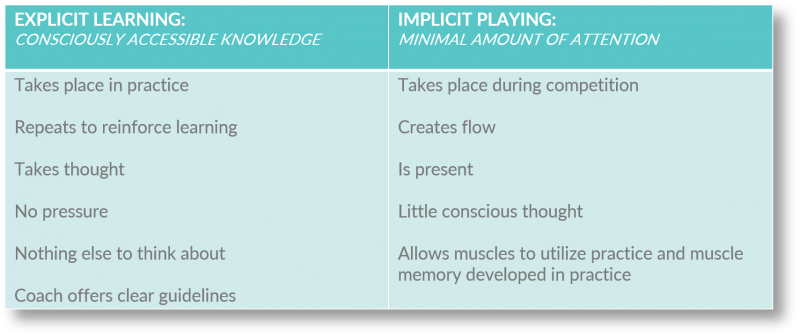
Play Like You Practice
Do you play like you practice? Do you practice like you play? I frequently hear from parents and their kids that they practice a lot and hard, but when ‘it mattered’ it didn’t look anything like practice. What’s happening in competition? It’s important for everyone to know that there IS a difference between practice and competition. I think we ‘get it’ at some level but it’s not often talked about or incorporated into training.
It is not likely that you have lost your ability to play your sport, play your instrument, or perform whatever specialty or expertise you have practiced. Though, it is very likely you simply don’t have the coping skills needed to deal with a competitive environment. This is where you need to add mindset and mental skills training to your regime and stop adding more physical practice. This is so incredibly important.
Understand the difference between practice and competition
What is the #1 reason performers don’t play like they practice? Many don’t understand that there is actually a huge difference between practice and competition. Practice is meant to develop a player. It’s a learning environment where repetition and reinforcement help to develop mental and physical skills. It’s the environment in which making mistakes gives an athlete the opportunity to do-over mistakes and learn from them.
Practice is NOT competition. During competition there’s no time for repetition, reinforcement, or do-overs. There’s little time to think. Unfortunately, much of this does carry over into competition causing frustration for the player, the performer, etc. Yes, you are human but competition is a different mindset. Coaches, trainers, and instructors need to talk about these differences and create deliberate practice time to work on the skills necessary for competition.
Another important concept in this differentiation is what you are not doing. If you are thinking during competition and getting frustrated, you are not allowing the muscle memory you built up in practice to be utilized. I often say, why practice if you aren’t going to allow that practice to be utilized during competition. Athletes must develop the ability to just play, meaning, they need to allow their muscle memory to be used.
Overriding your muscle memory is only a recipe for disaster. And, there’s no time for thinking in a fast pace, competitive environment.

Why mental skills in practice help us deal with competition
Competition is tough. Practice is tough. They are demanding on our mind, our efforts, and our mindset. These pressures require a special way of thinking and a special way of doing. And many performers, athletes, and even executives don’t just have the coping skills to deal with competitive conditions, just like they don’t just have the physical skills to play sports, instruments, sing, or manage.
When you have half of what you need for your development but not the other half, it creates a large margin of error and breakdown occurs. Practice is often fun for most. Even though practice may be challenging, there’s typically someone who walks you through it and you don’t have to think (much). This is not the case in a competitive environment. While in some situations the coach may still be there, they are usually there in a different capacity than practice.
You need to have the proper mental skills to rely on yourself to deal with everything that comes up during competition. These skills take your performance to new heights.
And there’s the challenges of everything else around competition
It’s also very challenging to cope with many of the other things that come up before, during and after competition – nerves, worries, doubts, fears, anger, frustration, mistakes, and losing If you don’t have the best coping skills to deal with these situations and others, it will create further challenges. For example, I made a mistake. What I’ve learned is that mistakes are bad. I must be bad. I should be upset with myself for having made that mistake.
Confidence lowers. Anxiety arises. You keep going but with lower confidence and increasing anxiety which effects performance and as this cycle continues confidences continues to decrease and anxiety increases. At some point this gets to a pinnacle where the athlete becomes afraid and some want to quit.
Your mind is talking, and your mindset starts to take over. If that is negative speak, well then, you are developing a negative mindset. If that is positive or neutral speak, you are on the right track.
Prepare for the unexpected
Prepare yourself to develop the best coping skills to align with your physical skills. This gives you more control over your environment, allowing you to perform more consistently and have more fun! You would never sign up for a tennis match if you never developed the skills to play tennis. Why would we play without developing mental skills (which I think are most important than physical skills)?
Having the optimal mental skills to incorporate in practice (learning how to use and integrate them) will help you physically play and compete like you practice. You will have a better sense of how to deal with nerves, worries, doubts, fears, anger, frustration, mistakes, and losing. In addition, it helps you cope when life throws you challenges you were not expecting.
Play like you practice
1. Know that practice and competition are different
2. Understand why they should be different.
3. Prepare for what happens before and during competition. Emotions are present and you have to figure out how to not think and utilize the muscle memory you developed in practice.
4. Develop the mental skills for competition
Beating the Demons System has been incredibly successful in helping performers develop the mental skills they need before, during and after competition.




